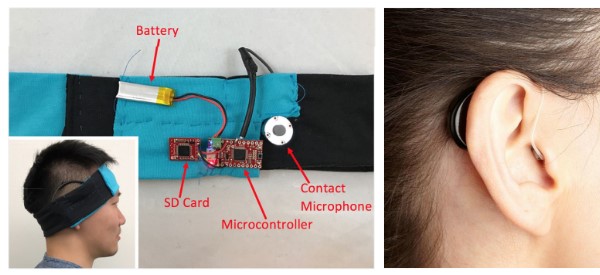
More than two-thirds of American adults are overweight. Clearly, we need to eat less and exercise more. Just as clearly, that is a whole lot easier to say than to do. Researchers have experimented with all sorts of ways to change a person’s behaviors about food and exercise, but nobody has found a silver bullet yet. Information does seem to help some people change; logging your eating and exercise does seem to be effective for many people. One problem is that it can be inconvenient and tiresome to keep such records. We’ve covered a variety of wearables designed to make it easier to keep track of what you eat, including an ear-mounted camera that watched each mouthful.
Researchers at Dartmouth College and Clemson University have collaborated on the development of a digital earpiece that can automatically track what you eat, and much more. The Auracle Project uses a microphone to gather sound data as you go through your daily activity. They have developed algorithms to distinguish between different actions: eating, drinking, smoking, and speaking. Furthermore, they are working on a system that can identify the type of food being eaten based on the characteristic sounds made when the subject chews it. In experiments, they were able to distinguish between six different foods (three “soft” and three “crunchy”) with greater than 90% accuracy.
The group hopes to condense the device into a package similar to a behind-the-ear hearing aid, making it an inconspicuous monitor that could be worn all day. The automatic recording of data would be far more convenient than most food tracking systems, which could provide more accurate information about caloric intake and other aspects of eating behavior. This could make it easier for users to monitor their eating and then make better choices once they are aware of this information.

